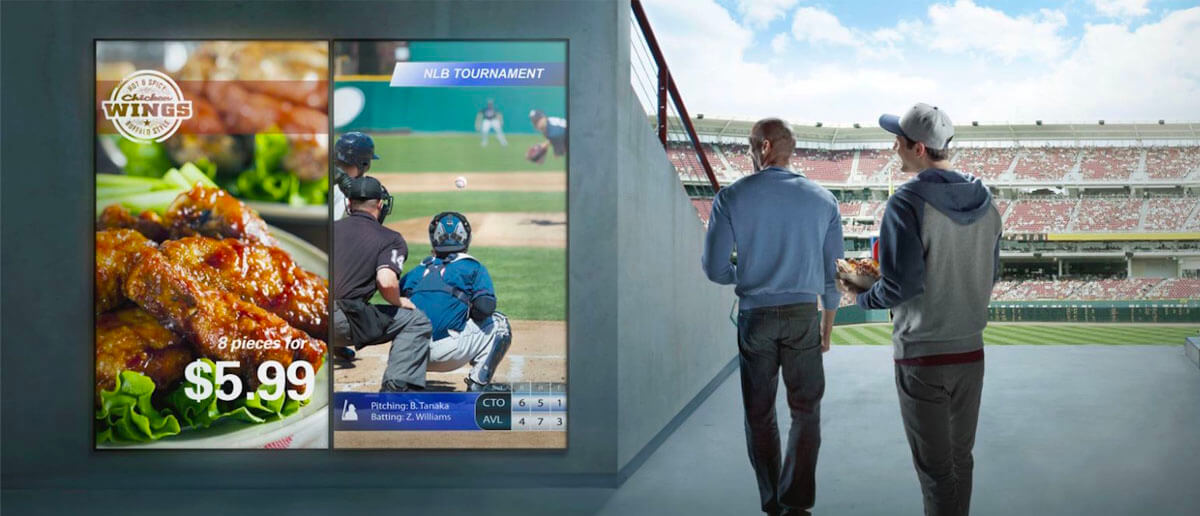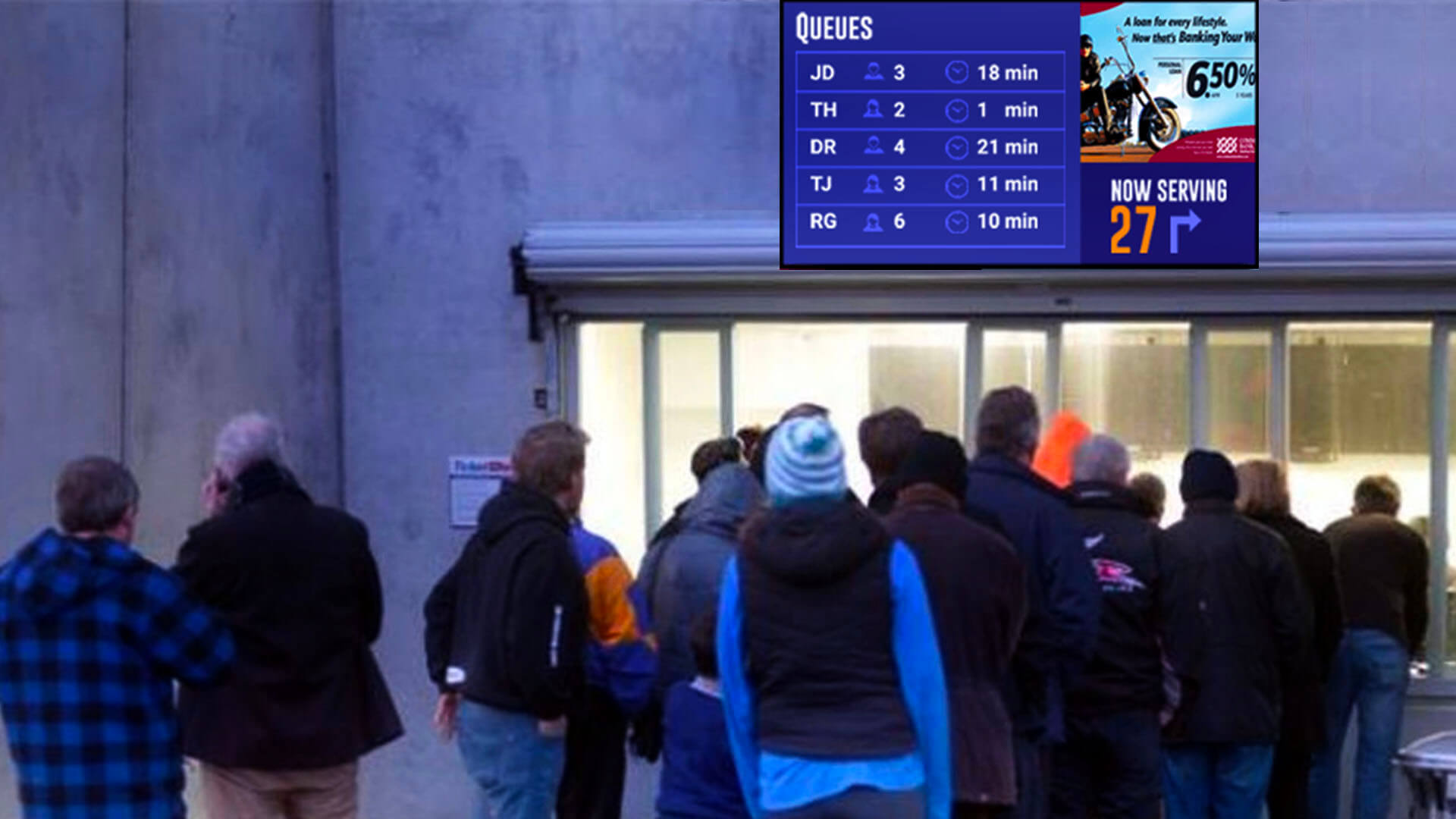
May 19 2023
5 min read


Mar
In the past decade, digital signage solutions have modernized the stadium and gaming arena experience, transforming how fans interact and bringing forth a considerable revenue increase for stadiums and arenas.
From promoting team merchandise to displaying real time game statistics, digital displays have been used for diverse purposes, creating memorable and engaging in-venue experiences for fans.
In this blog post, we will explore the top benefits of using digital signage in stadiums, ways to improve fan engagement, and maximizing revenue through effective digital signage tactics.
Amongst the myriad advantages of digital signage technology, stadiums bank the most on visual engagement and improved experience.
Using a single central digital signage software platform, like Pickcel, the admins can quickly update any screen with any content, that too, entirely remotely.
Often, these software have the potential of scheduling & automating content, publishing emergency messages, and integrating digital signage systems with operational tools to streamline business functioning. That’s what makes this technology an asset to the gaming real estate industry.
The most customary way sports venues can leverage digital displays to enhance the in-venue experience is by showing live game statistics, such as scores, player stats, and play-by-play commentary.
Stadiums can display such real-time content on jumbotron screens at the stadium playground or on smaller commercial displays scattered throughout the venue in high-traffic areas like concession stands and food courts, entrance gates, interactive fan zones, VIP lounges, and suites.
Additionally, stadiums and gaming arenas can use their digital signage network to:
Display upcoming games, events & promotions
Allow self-service at various checkpoints.
Manage crowds through a digital queue management system.
Rally sponsorship
Here are a few ways to enhance the game-day experience using signage technology!
1. Live streaming matches

Live streaming of matches on digital billboards or jumbo vision screens at gaming arenas is not new. However, many stadiums have used live streaming to spotlight fans besides broadcasting matches. For instance, the kiss cam is a popular entertainment in the US during match intervals.
2. Interactive infotainment
Interactive digital displays can be fun and engaging for fans to learn about team history, players, and merchandise. For example, a touchscreen kiosk or multi-touch video wall could allow fans to select a player and view their stats or watch highlights of their best plays.
3. Ticketing, wayfinding & crowd management

Digital displays at the ticketing counters and entrances can show the real time availability of match tickets, seating charts, and pricing.
In the event of large queues gathering at the stadium gates, these display networks can help split up the lines and communicate navigational information, such as gate numbers corresponding to the ticket numbers, estimated wait time, match beginning countdowns, and more.
Additionally, digital signage standees can support visitors in wayfinding by displaying venue maps, rules & regulations, helpline numbers, and information about various sections of the stadium.
4. Showcase fan-made content

Stadiums are as much about the games as they are about the fans. Gaming arenas frequently look for ideas to keep the crowd engaged during breaks and half-times. One such exciting piece of content for digital signage is showing fan art.
Fans often show their love for their favorite teams & athletes through placard messages & paintings, and body art. You can live stream these during the matches.
Another interesting way is to host social media hashtag contests before an upcoming match where fans can submit their content (for example, paintings, messages, and videos). And later, you can curate these fan made content and show them on the digital screens of your stadiums.
5. Promoting sports merchandise
Stadium digital signage is the best offline channel to narrowcast and effectively boost the sale of team merchandise, such as game-day t-shirts or commemorative items, that are only available during specific events.
Additionally, digital signage can encourage impulse purchases by displaying limited-time offers, countdown timers, and gamified discounts. It can also provide directions to the merchandise store or specific product displays, making it easier for fans to find and purchase items.
6. Creating a Virtual Reality experience
An emerging star in sports venue digital signage, Virtual Reality (VR) experiences provide fans with unprecedented immersion in the game day experience. By leveraging signage technology, sports facilities can create a 360-degree virtual reality environment that transports fans right to the heart of the action.
This technology can be used to create a variety of VR interactions, including virtual tours of the stadium or arena, allowing them to explore the facility and get a behind-the-scenes look at areas that are typically off public limits.
Another example is creating live game simulations, where fans can experience the action from the perspective of their favorite players or enjoy 360-degree replays of critical match moments.
Choosing the right digital signage solution provider is crucial for sports facilities to maximize their technology investment. Facility managers should carefully evaluate potential providers based on the 3 Es of Experience, Expertise, and Editability!
Experience
One of the critical factors to consider when choosing a digital signage provider for a stadium is the industry’s experience. For instance, most stadiums will have large-format screens like billboards and video walls. Ask your signage software provider if they have experience delivering solutions on these large-format screens.
Expertise
Stadium facility managers should also consider the provider’s expertise in the specific type of digital signage technology they need. For instance, a provider with expertise in LED video displays would be a good choice for a facility looking to install large-scale video walls.
Here is another example that I want to add to elaborate better on this point. At Pickcel, our sales team receives hundreds of requests monthly for 3D digital billboard software. The expectation built, perhaps, after we published this blog on our website.While Pickcel has an illustrious project portfolio of delivering complex integrations & advanced software solutions for billboards, video walls, and interactive displays, unfortunately, we currently don’t support 3D display technology, and that’s a bummer for many who approach us.
While Pickcel maintains a clean communication policy regarding its technical capabilities, some providers may want to dupe you by promising more than their delivery capacity. Look up their website, reviews, and case studies, and follow other pre-purchase research steps to validate their expertise.
Editability
Frequent content refreshes are a must to keep fans engaged in sports areas. Your digital signage software should maintain a near-absolute no-downtime record. The software content management system should have advanced properties like:
Complex layouts to support multiple contents simultaneously
Live broadcast capabilities
Integration capabilities to pull data from other platforms and show it on digital signage screens, etc.
Measuring the ROIs of digital signage in sports venues can help businesses determine the profitability of their investment and make data-driven decisions to optimize their marketing strategies. It can also analyze which signage campaigns are successful and which need improvement.
Measuring interaction: Engagement metrics such as the dwell time, attention time, and heat maps can be used to measure the success of digital signage campaigns in the stadiums and gaming arenas. Screens fitted with cameras & sensors can be used to collect these data while heat maps can be manually checked by analyzing video footage.
Revenue generation: Financial metrics such as conversion rates and net revenue are crucial for businesses that use digital signage in sports venues to drive sales. ROI measures the amount of income generated compared to the cost of the signage campaign. For example, if a business spends $10,000 on a digital signage campaign in a sports venue and generates $20,000 in revenue, the ROI would be 100%.
Sports venues must keep up with digital signage trends to remain competitive and provide a memorable fan experience. One popular trend is integrating mobile technology with digital signage displays. Features like QR codes, mobile app integration, and interactive screen solutions provide an immersive and engaging in-venue experience.
Another growing trend is using AI-powered technology and data analytics to create personalized experiences for fans in gaming arenas. Digital screens can be augmented with these technologies to study viewer behaviors and subsequently use those data to tailor-serve experiences.
Digital signage brings massive ROIs for stadiums and gaming arenas. It helps to engage the visitors, upsell merchandize and generate higher revenues. However, it is important to choose the right digital signage hardware and software solutions to ensure you reap the maximum benefits.
If you are looking for a robust software to power your stadium screens and video walls, Pickcel may be the right fit for you. To find out, you can schedule a demo with our team.
Take complete control of what you show on your digital signage & how you show it.
Start Free Trial Schedule My Demo
May 19 2023
5 min read

May 16 2023
8 min read

May 12 2023
9 min read

Apr 28 2023
14 min read